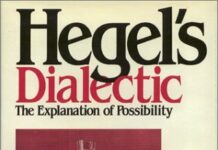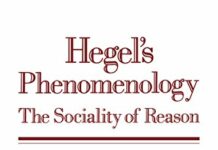
Ebook Info
- Published: 2001
- Number of pages: 812 pages
- Format: PDF
- File Size: 17.69 MB
- Authors: Terry Pinkard
Description
One of the founders of modern philosophical thought Georg Wilhelm Friedrich Hegel (1770-1831) has gained the reputation of being one of the most abstruse and impenetrable of thinkers. This first major biography of Hegel in English offers not only a complete, up-to-date account of the life, but also an overview of the key philosophical concepts in Hegel’s work in an accessible style. Terry Pinkard situates Hegel firmly in the historical context of his times. The story of that life is of an ambitious, powerful thinker living in a period of great tumult dominated by the figure of Napolean. Pinkard explores Hegel’s interactions with some of the great minds of this period: Hölderlin, Goethe, Humboldt, Schelling, Novalis, the Schlegels, Mendelssohn, and others. Throughout, he avoids Hegal’s own famously technical jargon in order to display the full sweep and power of Hegel’s thought. Terry Pinkard is professor of Philosophy at Northwestern University and is author/editor of five previous books, the most recent being ^UHegel’s Phenomenology (Cambridge, 1996). He is honorary Professor of the Philosophy Faculty of TÜbingen University, Germany and serves on the advisory board for the Zeitschrift fÜr Philosophique Forschung.
User’s Reviews
Editorial Reviews: Review “Satisfying, well-written…” Magill’s Literary Annual”Pinkard does an incredible job of explaining Hegel’s strictly philosophical ideas and largely overcomes the barrier of Hegel’s notoriously obscure style.” The New York Times Book Review”[Pinkard] does a creditable job of explaining Hegel’s strictly philosophical ideas and largely overcomes the barrier of Hegel’s notoriously obscure style.” The New York Times Book Review”This is a magnificent book, conceived on a grand scale and executed with scholarship, wit, and a sense of drama.” International Philosophical Quarterly”Mr. Pinkard offers a moving account of a precarious and harried life, interspersing it with lucid and not unduly long accounts of the main arguments of Hegel’s works….Mr. Pinkard has written engrossingly of a supreme instance of the life dedicated to thinking.” Richard Velkley, The Washington Times”By now it is clear that Terry Pinkard offers the most rounded, richly filled-out picture of Hegel, as both philosopher and man, that we have ever had in English. This will quickly become the standard biography of Hegel, and richly deserves to do so. In an age of fine Hegel scholarship, this is a towering achievement.” Patrick Riley, Boston Book Review”The publishers call his book ‘the first major biography of Hegel in English,’ and for once they are not exaggerating. They could in fact have gone further…this is the most rounded and reliable life of Hegel there has ever been… Pinkard has separated his interpretations of the thought from his descriptions of the life…” London Review of Books”[Pinkard] offers readers a wider window on a period of tumultuous cultural and political innovation that bears more than one fleeting relevance for our own.” George R. Lucas Jr., The Sun”In clear and modest language, Pinkard fills the breach between Hegelian Bildung (humanistic education) and the average American adult. He concisely summarizes the philosopher’s key works, placing them in the larger context of Hegel’s life and times. Rich details of Hegel’s own person – his Napoleonic haircut, wooden lecture style and ‘very characteristic smile’ – enrich a narrative of operatic scope, complete with mad poet friend (Holderlin), illegimate son (Ludwig Fischer) and philosophical nemesis (J.F. Fries). Hegel’s philosophy, which finessed contradiction, mirrored the contradictions in his life. The portrait that emerges wins sympathy and understanding. Pinkard frees Hegel from the obscurity that unfairly clouds his memory and shows him, stunningly, for who he really was: an early modern version of ourselves.” Publishers Weekly (April 10, 2000)”Terry Pinkard’s Hegel is one of the best introductions available to the philosophy of Hegel…Anyone who wants to know what Hegel had to say, and why it is still important, could do no better than begin with this biography.” Political Affairs Book Description A complete account of his life and an overview of the philosophical concepts in Hegel’s work.
Reviews from Amazon users which were colected at the time this book was published on the website:
⭐With some knowledge of Marx and early existentialism I thought I had a pretty good idea of who G.W.F. Hegel was. One of the best results of reading this detailed and well-written biography is that it showed how limited a stereotype I had of the man. Pinkard gives a synopsis of Hegel’s most important works but does that in chapters that can be skipped if the reader wants the personal biography only. Both the personal and philosophical angles on Hegel are well done.The personal life of Hegel was completely unknown to me. Hegel enjoyed good times and great philosophical discussions with his close friends Schelling and Holderlin when younger. That in itself was not unusual. But what was initially surprising to me was how kind and social Hegel could be as he got older. Throughout his life he went out of his way to give extra time and financial help to students who came from poor backgrounds. He once traveled by boat with a group of students to visit surreptitiously a friend imprisoned by the repressive government. He cared deeply about his family but had a mixed relationship with his illegitimate son Ludwig. When Ludwig was five, Hegel brought him into his home as part of his family but, as Pinkard shows, Hegel often treated him in a less than familial fashion compared to his other two sons. Until his later years Hegel was often the most gregarious person at a party. Pinkard gives dozens of examples that humanize this man so often portrayed as a cold and austere figure.Early on Hegel made up his mind that his most serious work demanded a serious and new terminology to explain his ideas, a terminology which (as he himself knew) was very often turgid and incomprehensible to those trying to read and understand him. In his view he was creating a new vision of philosophy. But this off-putting terminology and style were not true of his more “popular” work – either in speaking or writing. When Hegel was rector of the “gymnasium” in Nuremburg from 1808-1816, he was extremely popular both as a teacher and administrator. He single-handedly renewed the level of “gymnasium” education in Nuremberg and his end-of-the-year addresses to parents and the public were powerful and clear arguments toward the goal of “Bildung” – the cultivation of knowledge and self-awareness that leads a young person toward being an integrated and mature adult. Besides elements of his personal life, his educational and personal leadership in Nuremburg was for me one of the most eye-opening factors in Hegel’s life.But Pinkard also points out Hegel’s flaws. One which appears several times was his view of women as less intellectually capable than men – a common view at the time but one which this philosopher of self-consciousness never transcended. But another major issue was Hegel’s single-minded fixation on his “system.” Many times Pinkard shows Hegel struggling to “fit” an historical event or personal experience into his system. His system was in many ways the coherence theory of truth gone wild. Some fundamental ideas from the science of his day did not “fit” and were often ridiculed by Hegel. Personal experiences or historical events were taken as representations of worldwide processes – “spirit” being realized in history toward the increase of “freedom” – without Hegel ever stopping to consider his own limitations in understanding these events. Hegel had many insights into the development of self-consciousness and into what appear to be absolute contradictions in life and history. But his application of his ideas to actual events was more often than not wrong – often blatantly wrong. For Hegel (and other post-Kantian idealists) it simply could not be the case that his “system” was wrong. Events had to “fit” the system.For anyone interested in the full picture of one of the most important figures in the history of Western philosophy, this is a worthwhile and (yes) engaging biography. Even if we can see clearly now where Hegel was wrong, showing Hegel’s role in the culture and thought in Germany after Kant makes this thoroughly researched and well-written book a highly useful and enlightening reading experience.
⭐I have just begun reading Terry Pinkard’s biography of Hegel, but I am familiar with his other writings on Hegel, and what he seems to have done here is offer both biography and a very good articulation of Hegel’s philosophy threaded within it. Another Hegel scholar Merold Westphal remarked in his “History and Truth in Hegel’s Phenomenology” that ‘Hegelese is a dead language, and should remain so’. I agree with Westphal, and this makes it all the more important that people like he and Pinkard are doing hermeneutic justice within a contemporary English idiom to Hegel’s most important contributions. Pinkard, along with the Americans Robert Brandom and Robert Pippin, is a major contributor to a new and more accurate understanding of Hegel in English-speaking philosophy. This new understanding is post-Kantian and post-metaphysical; it emphasizes the temporal normativity of reason as Hegel’s most important insight; it is compelling and highly relevant to people versed in the problems of 20th-century analytic philosophy. There is also implicit in Pinkard’s articulation of Hegel a strong understanding of the limitations of 20th-century ‘continental’, phenomenological, or Heideggerian philosophy. In my view the greatest value of Pinkard’s book is the implicit (and sometimes explicit) critique of both 20th-century analytic and continental philosophy that is threaded throughout his clarifying articulation of Hegel’s philosophy. Highly recommended for anyone concerned about the state of philosophy.
⭐My review will be short—this is because I think that the other reviews on here capture much of feel of, and the detail provided in, Pinkard’s biography of Hegel. The detail in the book is stunning, but it is also easy to follow; the narrative doesn’t get bogged down by too many unnecessary details or repetitious claims. What I appreciated most about the book was Pinkard’s ability to depict Hegel’s life in such a way that it makes sense why Hegel’s philosophy has been interpreted in polarizing ways. And I am thankful for the way in which Pinkard situates Hegel’s life and concerns in order to shed much light on what is usually taken to be an impenetrably obscure topic: Hegel’s entire system. Though it was long, and at times tedious (Hegel did not live a life filled with remarkably “extraordinary” personal events), I would definitely recommend the book to those who, like me, have a difficult time grasping a philosopher’s work without also grasping a clearer picture of the context in which they lived their life.
⭐Excellent very readable. Not too technical but includes both Hegel’s philosophy & his bio as well as the context & milieu of the times (1770 – 1831) German Romanticism, German Idealist philosophy, & the impact of the French Revolution. A who’s who of everyone who came in contact with Hegel. Well documented — great end notes & a good bibliography. Pinkard is an outstanding Hegel scholar. A must read for anyone interested in this period of time.
⭐Pinkard is a great writer about Hegel’s philosophy and the ideas of that time. I’ve read this book three times, which speaks to the pleasure of reading it. Hegel’s life was not filled with fascinating incidents, but this book skillfully conveys the richness of his ideas. This is a rare book, which could pass for popular biography but that contains first-class writing about philosophy and the history of ideas. Highly recommended.
⭐Great read
⭐Written very lucidly the book is filled with almost all details about Hegel’s life. However if interested in Hegel philosophy then refer copleston or lavine. The book is about 775 pages long and I bought it in ₹1275.
Keywords
Free Download Hegel: A Biography in PDF format
Hegel: A Biography PDF Free Download
Download Hegel: A Biography 2001 PDF Free
Hegel: A Biography 2001 PDF Free Download
Download Hegel: A Biography PDF
Free Download Ebook Hegel: A Biography




